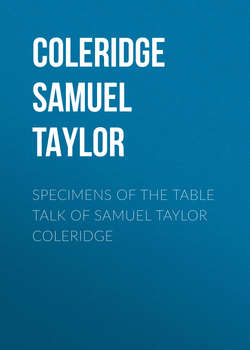Читать книгу Specimens of the Table Talk of Samuel Taylor Coleridge - Coleridge Samuel Taylor - Страница 8
TABLE TALK
April 27. 1823
ОглавлениеKEAN.—SIR JAMES MACKINTOSH.—SIR H. DAVY.—ROBERT SMITH.—CANNING.– NATIONAL DEBT.—POOR LAWS
Kean is original; but he copies from himself. His rapid descents from the hyper-tragic to the infra-colloquial, though sometimes productive of great effect, are often unreasonable. To see him act, is like reading Shakspeare by flashes of lightning. I do not think him thorough-bred gentleman enough to play Othello.
* * * * *
Sir James Mackintosh is the king of the men of talent. He is a most elegant converger. How well I remember his giving breakfast to me and Sir Humphry Davy, at that time an unknown young man, and our having a very spirited talk about Locke and Newton, and so forth! When Davy was gone, Mackintosh said to me, "That's a very extraordinary young man; but he is gone wrong on some points." But Davy was, at that time at least, a man of genius; and I doubt if Mackintosh ever heartily appreciated an eminently original man. He is uncommonly powerful in his own line; but it is not the line of a first- rate man. After all his fluency and brilliant erudition, you can rarely carry off any thing worth preserving. You might not improperly write on his forehead, "Warehouse to let!" He always dealt too much in generalities for a lawyer. He is deficient in power in applying his principles to the points in debate. I remember Robert Smith had much more logical ability; but Smith aimed at conquest by any gladiatorial shift; whereas Mackintosh was uniformly candid in argument. I am speaking now from old recollections.
* * * * *
Canning is very irritable, surprisingly so for a wit who is always giving such hard knocks. He should have put on an ass's skin before he went into parliament. Lord Liverpool is the single stay of this ministry; but he is not a man of a directing mind. He cannot ride on the whirlwind. He serves as the isthmus to connect one half of the cabinet with the other. He always gives you the common sense of the matter, and in that it is that his strength in debate lies.
* * * * *
The national debt has, in fact, made more men rich than have a right to be so, or, rather, any ultimate power, in case of a struggle, of actualizing their riches. It is, in effect, like an ordinary, where three hundred tickets have been distributed, but where there is, in truth, room only for one hundred. So long as you can amuse the company with any thing else, or make them come in successively, all is well, and the whole three hundred fancy themselves sure of a dinner; but if any suspicion of a hoax should arise, and they were all to rush into the room at once, there would be two hundred without a potato for their money; and the table would be occupied by the landholders, who live on the spot.
* * * * *
Poor-laws are the inevitable accompaniments of an extensive commerce and a manufacturing system. In Scotland, they did without them, till Glasgow and Paisley became great manufacturing places, and then people said, "We must subscribe for the poor, or else we shall have poor-laws." That is to say, they enacted for themselves a poor-law in order to avoid having a poor-law enacted for them. It is absurd to talk of Queen Elizabeth's act as creating the poor-laws of this country. The poor-rates are the consideration paid by, or on behalf of, capitalists for having labour at demand. It is the price, and nothing else. The hardship consists in the agricultural interest having to pay an undue proportion of the rates; for although, perhaps, in the end, the land becomes more valuable, yet, at the first, the landowners have to bear all the brunt. I think there ought to be a fixed revolving period for the equalization of rates.
